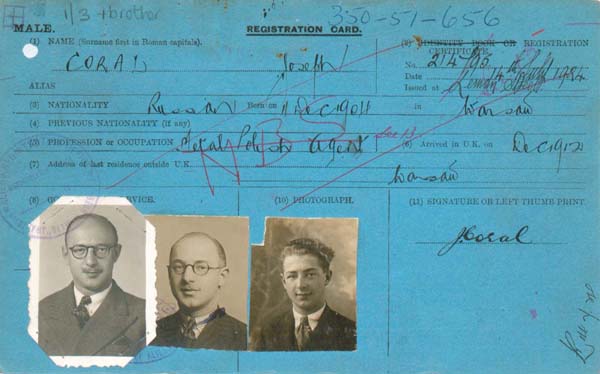|
|
. |
| |
|
|
| |
Joe Coral (born Joseph
Kagarlitsky)
b. in Warsaw, Poland
11 December 1904
d. 16 December 1996, University College Hospital, London
(lung cancer)
Joe Coral (then
Joseph Kagarlitsky) was born in into a Jewish family in Warsaw, Poland in 1904.
His father, Abraham Kagarlitsky, died when he was at an early age and his
mother, Jessica, joined a wave of migrants in 1912 from Eastern Europe who were
seeking a better life in the United Kingdom.
The family took on the
surname Coral and Joseph became Joe to make it easier to get a job, of which he
had many after leaving school at the age of 14. Having a flair for mathematics
Joe took a clerk's position in a lamp-making firm which gave him the
connections to meet bookmakers and become a 'runner' (someone who takes bets on
behalf of a bookmaker - illegal since 1853).
Joe was sacked from the
lamp-maker's workshop for, in Coral's words, ‘concentrating on the wrong
ledger’. From there he went to work at a small London advertising agency
which gave him enough time off begin taking bets in a billiards club in Stoke
Newington during the General Strike of 1926. In 1927 he left advertising to set
up his own pitches at the Harringay and White City greyhound racing tracks. The
introduction of the electric hare from the United States of America in 1926
assisted Coral's career as it created a legal context for trackside betting in
London.
Joe Coral and his brother had failed to register as 'aliens'
resident in the UK until 1924 and were fined £20 each at Thames
Magistrates Court. It was the beginning of a long running feud that would see
Joe on the wrong side of the law until 1952.
Like many bookies of the
time, Joe Coral ran both a legal and an illegal trade. The legitimate side of
the business was greyhound racing and credit betting with cheques, where no
ready money changed hands, but the most lucrative wing of his business was
street betting. He made strong efforts to develope a local network of agents to
collect bets on his behalf in pubs, shops and back alleyways. By 1930 he
employed between seventy and eighty agents who collected ready-money bets for
him. By that year he had also taken over the pitches of Bill Chandler, a
popular Hoxton bookie, who was unable to compete with Coral.
Joe Coral's
success as a bookie got the attention of Charles Sabini, commonly known as
Darby Sabini, a gang leader of mixed Italian and English parentage. Darby
Sabini was head of the Sabinis and 'king of the racecourse gangs' that
dominated the London underworld and racecourses throughout the south of England
for much of the early twentieth century. Sabini had extensive police and
political connections including judges, politicians and police officials.
Sabini's power rested on an alliance of Italians and Jewish bookmakers but Joe
Coral managed to defend himself from the racecourse protection rackets
operating against bookmakers. It was a dangerous time for Joe but he was
relieved of the pressure when Sabini moved to Brighton to run the same
operations there. Sabini was later immortalized as the gangster Colleoni in
Graham Greene's Brighton Rock.
Joe Coral was one of the largest regional
bookmakers in England by 1939. War interrupted the betting business, owing to
the huge reductions in the racing calendar, but Coral was still busy. He opened
a credit betting office in Stoke Newington in 1941, and moved the office to
London's West End four years later. After the war, moreover, Coral was one of a
number of bookmakers who advertised betting by post in the major sporting
newspapers such as the Sporting Life and the Sporting Chronicle.
‘Sporting’ newspapers were really betting newspapers. Betting
by post was legal because no cash changed hands, only cheques or postal orders.
The illegal business continued to thrive, however, but the 1950s witnessed a
thawing of official attitudes to betting and gambling. During an era of full
employment and affluence the idea that the working classes would gamble
themselves into poverty was misplaced. The police also took the opportunity to
argue to the royal commission on betting, lotteries and gaming of 1949–51
that the law was unworkable, and that illegal betting was an open secret which
was impossible to stop. This change of mind led to the Betting and Gaming Act
of 1960, which finally legalized off-course cash betting, and introduced the
licensed betting office to the high streets and back streets of England and
Wales.
Joe continued his battle with the authorities over his status as
a citizen. The Aliens Restriction (Amendment) Act 1919 was the legislation that
gave to the government the power to require such individuals to register with
the police and to pay a registration fee. In return the individual received a
police certificate of registration. The cards had to be updated every three
years and were known as continuation cards. Joe's card for 1932 - 1935 shows
him being fined £40 for failing to notify the police of change of address
in 1932. Coral was then cautioned by letter in 1935 for failing to report his
marriage which took place in 1932. The last extract from Joe Coral's cards
shows that in 1943 he was cautioned again by letter for failing to notify an
intended change of address. The details on the cards continue until his
application for naturalisation in 1952. The initial Home Office reaction,
according to a file released at the National Archives, was to refuse. But
senior figures decided that the driving offences and unproven suspicions were
not sufficient grounds. One official commented: "For a bookmaker in Stoke
Newington he is not a bad sort of fellow."
|
| |
 |
| |
Joe
Coral, along with other bookmakers such as William
Hill, were not keen about legalization. A requirement of the 1960 act was
that any new betting office needed to show ‘unstimulated demand’
before being granted a licence. One way was to convert existing business
premises to a licensed betting office. Coral paid to have the sweetshop of one
of his agents turned into a betting shop. The most efficient way, however, to
negotiate the new law was to buy up other offices, and by 1962 Coral had
twenty-three shops. Subsequently during the 1960s the corporate structure of
bookmaking became more fully fledged, and bookmaking firms became public
companies, operating on a legal and commercial basis. Corals became a public
limited company in 1963, and diversified into casinos, bingo halls, and hotels.
The firm was bought, in 1970, by the brewing, hotels, and entertainments group
Bass. The motives for the take-over were clear: Corals' annual profits were
£1.5 million in that year. He remained president of the bookmaking firm
and a major company director.
By the mid-1970s expansion had produced
650 Corals bookmakers' shops, and by the end of the decade Corals was one of
the ‘big four’ bookmaking firms. It retained that status into the
1990s. In 1992 Corals entered into an arrangement with the tote, the pool
betting system based at the racecourses, whereby pool bets could be placed at
Corals outlets.
Coral had married his wife, Dorothy Helen, in 1932. They
brought up three sons, two of whom, Bernard and Nicholas, pursued careers in
the family business from the early 1950s. Joe Coral died in University College
Hospital, Camden, London, on 16 December 1996 from lung cancer, having suffered
from dementia for some years. |
 |
| |
|
|
|
|
| |
|
. |
|
|
